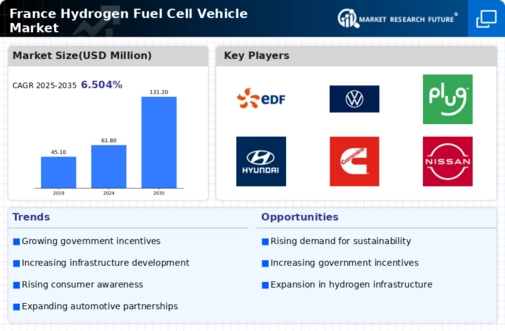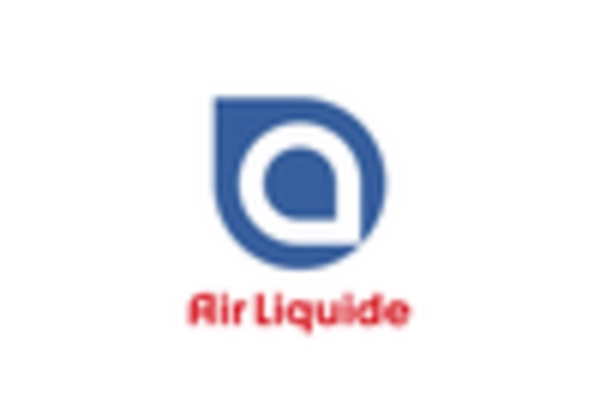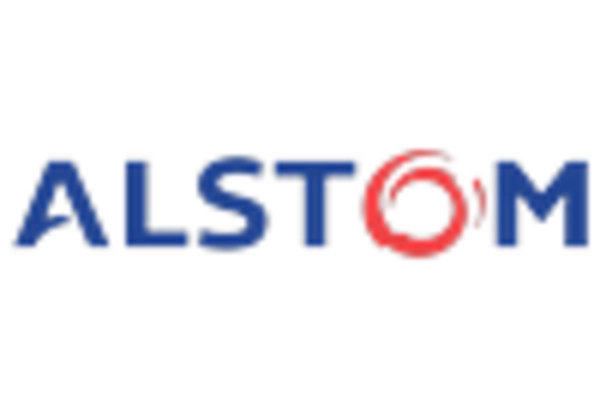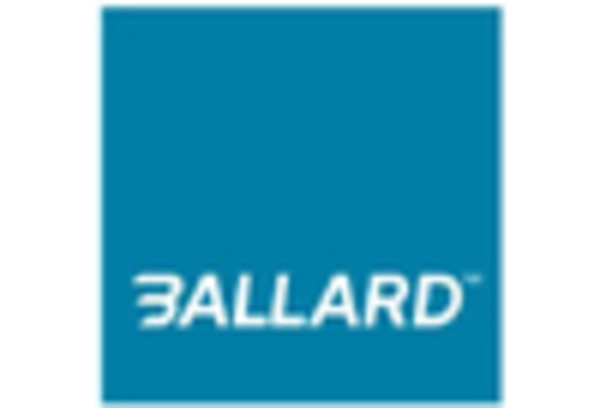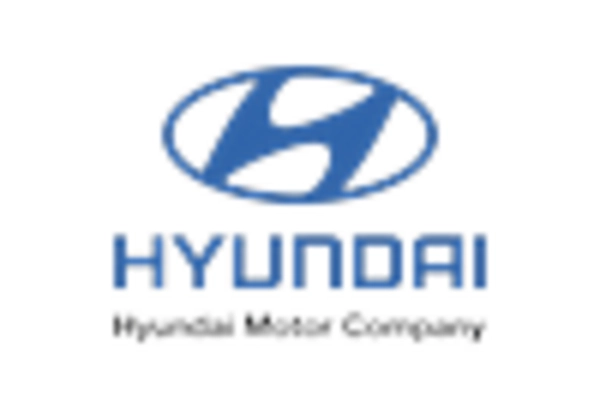Infrastructure Development
The expansion of hydrogen refueling infrastructure is a pivotal driver for the France Hydrogen Fuel Cell Vehicle Market. As of January 2026, France boasts over 100 hydrogen refueling stations, with plans to increase this number significantly in the coming years. The French government, in collaboration with private stakeholders, is investing heavily in the development of a comprehensive hydrogen infrastructure network. This initiative aims to ensure that hydrogen FCVs are accessible to a broader audience, thereby alleviating range anxiety among potential users. The establishment of a reliable refueling network is essential for the widespread adoption of hydrogen vehicles, as it directly influences consumer confidence and market penetration. Moreover, the integration of hydrogen stations into existing fuel networks may further facilitate the transition to hydrogen as a mainstream fuel source, thereby propelling the growth of the hydrogen FCV market in France.
Government Incentives and Subsidies
The France Hydrogen Fuel Cell Vehicle Market benefits significantly from government incentives and subsidies aimed at promoting clean transportation. The French government has established various financial support mechanisms, including grants and tax reductions, to encourage the adoption of hydrogen fuel cell vehicles (FCVs). In 2025, the French government allocated approximately 1.5 billion euros to support hydrogen technologies, which includes funding for infrastructure development and vehicle purchases. This financial backing is crucial for reducing the initial cost barrier for consumers and businesses, thereby stimulating market growth. Furthermore, the French National Hydrogen Strategy outlines ambitious targets for hydrogen production and usage, which further solidifies the government's commitment to fostering a robust hydrogen economy. As a result, these incentives are likely to enhance the attractiveness of hydrogen FCVs in the French market.
Technological Innovations in Fuel Cells
Technological advancements in fuel cell technology are significantly influencing the France Hydrogen Fuel Cell Vehicle Market. Innovations in fuel cell efficiency, durability, and cost-effectiveness are making hydrogen vehicles more appealing to consumers and manufacturers alike. Research and development efforts in France have led to the creation of more efficient fuel cells, which can enhance vehicle performance and reduce operational costs. For instance, advancements in membrane technology and catalysts have improved the overall efficiency of hydrogen fuel cells, making them competitive with traditional internal combustion engines. As of early 2026, several French automotive manufacturers are actively investing in R&D to develop next-generation hydrogen vehicles, which could potentially reshape the market landscape. These technological improvements not only enhance the viability of hydrogen FCVs but also contribute to the overall growth of the hydrogen economy in France.
Growing Consumer Awareness and Acceptance
Increasing consumer awareness and acceptance of hydrogen fuel cell technology is a vital driver for the France Hydrogen Fuel Cell Vehicle Market. As public knowledge about the environmental benefits of hydrogen vehicles expands, more consumers are likely to consider them as a viable alternative to traditional vehicles. Educational campaigns and promotional events organized by both the government and private sector are playing a crucial role in enhancing public understanding of hydrogen technology. Surveys conducted in late 2025 indicate that consumer interest in hydrogen FCVs has risen significantly, with many respondents expressing a willingness to switch to cleaner transportation options. This growing acceptance is further supported by the increasing availability of hydrogen vehicles in the market, which provides consumers with more choices. As awareness continues to grow, it is anticipated that the demand for hydrogen fuel cell vehicles will increase, thereby propelling the market forward.
Environmental Regulations and Climate Goals
The France Hydrogen Fuel Cell Vehicle Market is significantly influenced by stringent environmental regulations and ambitious climate goals set by the French government. France aims to achieve carbon neutrality by 2050, and hydrogen fuel cell vehicles are seen as a crucial component in this transition. The government has implemented various regulations to limit greenhouse gas emissions from the transportation sector, thereby encouraging the adoption of cleaner technologies. In 2025, the French government introduced a new regulation mandating that a certain percentage of new vehicles sold must be zero-emission, which includes hydrogen FCVs. This regulatory framework not only drives manufacturers to innovate but also incentivizes consumers to consider hydrogen vehicles as a viable alternative. Consequently, these environmental policies are likely to accelerate the growth of the hydrogen FCV market in France, aligning with the nation's sustainability objectives.


